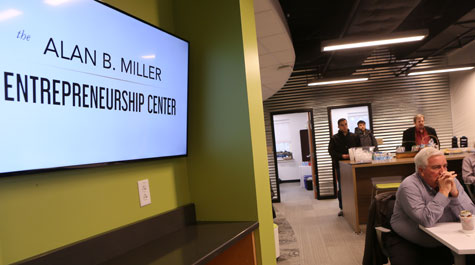Students’ ideas are percolating at the new Alan B. Miller Entrepreneurship Center
Students are exploring business ideas, collaborating and benefiting from the help of faculty and professionals as the new semester started with the Alan B. Miller Entrepreneurship Center up and running.
The center opened on the third floor of the Raymond A. Mason School of Business late last year. It features co-working spaces with a modern feel and is intended for use by students from across campus.
Smith-Rose, a psychology major, is taking entrepreneurship classes and becoming active around the center.
“The goal of the center is to bring students together because up until now there hasn’t been any congregation of startups on campus,” Smith-Rose said. “What people don’t really know is that there have been a lot of successful startups that have come out of here, but they’ve been underground. Up until now no one’s had a place to sit down and talk about this.”
Graham Henshaw, executive director of the center and a Mason School clinical professor, said the idea is to encourage students from all parts of the campus to use the center to make progress on their entrepreneurial endeavors. The criterion for access is that students must be actively working on a project that can make use of the center’s resources. Now that the space is set up and there is a home for all of the center’s programs, they are moving to the stage of inviting entrepreneurial thinkers from the campus community to participate.
Activities within the center so far have included meetings of entrepreneurship clubs, talks and networking with entrepreneurs, mentor office hours and students working on their projects. The center also recently launched StartupTree, which is an online platform that allows student entrepreneurs to connect with each other.
“If you were to come back in a month and a half, what we hope is there will be a bunch of students from across campus all working on ideas and helping each other to make progress,” Henshaw said. “And so that’s really the focus. We want the activity to be students doing that, making progress, connecting with mentors, using the resources that we have like StartupTree.”
Chris Hoyle ’18 has worked with Henshaw on the center’s website over the last few months. He’s a computer science major and business analytics minor currently working across disciplines doing consulting with a local company and the science department.
“It’s been a really rewarding process, and I’m excited to see everything come together,” Hoyle said.
Henshaw researched entrepreneurship across campus and found out it’s taking place everywhere, he said. He and Managing Director Ron Monark have their offices in the center and are making themselves and the resources available to all students working on ideas.
The entrepreneurship curriculum has also been updated in the past year, moving away from the traditional business plan-centric approach towards customer development, an iterative approach that produces business models that encourage customer feedback. Henshaw said that by making material accessible to students to read and study on their own online, he has time in class to do exercises and have discussions. Entrepreneurship courses are project-based, with students working on an entrepreneurial endeavor all semester long.
They can use the center to work on their projects, do research and kick around ideas. It’s designed to be a hub, and it’s starting to hum.
The center is working in conjunction with the Jim and Bobbie Ukrop Innovation & Design Studio at the Mason School, as well as the Launchpad Greater Williamsburg Business Incubator. It’s all overlapping as part of a complementary way of teaching that emphasizes exploration of ambiguously defined problems and iteration towards solutions, said Michael Luchs, an associate professor at the Mason School and founding director of Innovation & Design Studio. He pointed out that he and Henshaw both came from private industry and that this approach, often referred to as Design Thinking, is not nearly as new in industry as it is in academia.
“It’s an opportunity in that we’re offering courses and programs to our grads and undergrads and to our executives that are rarely offered on a campus, especially a campus with such a strong liberal arts orientation” Luchs said. “So, we’re trailblazing in an academic sense, and that has challenges. But as far as practice, there is demand for these skills and mindset and great evidence that these can be learned in a campus setting and are valued by employers and investors.”
Whether in class or working in the center, students have all of this available to fuel their projects.
“What the campus is missing — they need to be inspired by young founders,” Smith-Rose said. “There’s a misperception that students can’t do their own startups because they’re young. Hopefully students will be inspired and get some energy that they can do this themselves.”


















